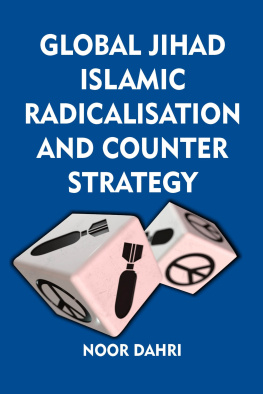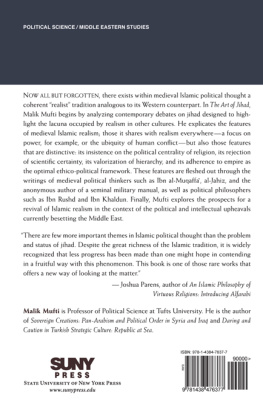Suhas Majumdar - Jihad: The Islamic Doctrine of Permanent War
Here you can read online Suhas Majumdar - Jihad: The Islamic Doctrine of Permanent War full text of the book (entire story) in english for free. Download pdf and epub, get meaning, cover and reviews about this ebook. City: New Delhi, publisher: Voice of India, genre: Religion. Description of the work, (preface) as well as reviews are available. Best literature library LitArk.com created for fans of good reading and offers a wide selection of genres:
Romance novel
Science fiction
Adventure
Detective
Science
History
Home and family
Prose
Art
Politics
Computer
Non-fiction
Religion
Business
Children
Humor
Choose a favorite category and find really read worthwhile books. Enjoy immersion in the world of imagination, feel the emotions of the characters or learn something new for yourself, make an fascinating discovery.
- Book:Jihad: The Islamic Doctrine of Permanent War
- Author:
- Publisher:Voice of India
- Genre:
- City:New Delhi
- Rating:5 / 5
- Favourites:Add to favourites
- Your mark:
- 100
- 1
- 2
- 3
- 4
- 5
Jihad: The Islamic Doctrine of Permanent War: summary, description and annotation
We offer to read an annotation, description, summary or preface (depends on what the author of the book "Jihad: The Islamic Doctrine of Permanent War" wrote himself). If you haven't found the necessary information about the book — write in the comments, we will try to find it.
Jihad: The Islamic Doctrine of Permanent War — read online for free the complete book (whole text) full work
Below is the text of the book, divided by pages. System saving the place of the last page read, allows you to conveniently read the book "Jihad: The Islamic Doctrine of Permanent War" online for free, without having to search again every time where you left off. Put a bookmark, and you can go to the page where you finished reading at any time.
Font size:
Interval:
Bookmark:
JIHD THE ISLAMIC DOCTRINE OF PERMANENT WAR
Voice of India, New Delhi
C ontents Foreword Preface References Introduction Jihd in the Koran Jihd in the Hadis Ghanmah or Plunder in the Koran 4. Plunder ( Ghanmah ) in the Hadis 5. Islamic Expansion through Jihd : The Evidence of the Sunnah 6. Destruction of Idols and Idol-Temples in Jihd : The Evidence of the Sunnah 7. Slaughter of Infidels in Jihd : The Evidence of the Sunnah 8. Plunder ( Ghanmah ) in Jihd : The Evidence of the Sunnah Jihd in the Shariat Jihd and Religious Riot 11. Recapitulation 12. Conclusion Appendix I. Jihd and Expulsion of Non-Muslims from Islamic Countries II. Jizyah and the Zimm III. Development of the Doctrine of Jihd in the Koran IV. Akbar s Attitude to Jihd V. Doctrine of Jihd as Defensive War Foreword There was a time, not so long ago, when the exponents of jihd minced no words and pulled no punches. They were brutally frank in spelling out what jihd really meant. But times have changed, particularly after the collapse of Christianity in the West and the rise of modern rationalism and humanism. Standards of moral judgment have increasingly tended to become universal, and no statement of faith can escape scrutiny simply because it is made in a book hailed as holy by some people. Defenders of jihd have been forced to develop an apologetics. They are now trying to protect by means of scholarship a doctrine which has so far been sustained by means of the sword. In the present study, Professor Suhas Majumdar has seen through this scholarship , and demolished it brick by brick. He has rescued the doctrine of jihd from under the mass of pretentious verbiage, and made it stand in its pristine purity. Let no one say any more that jihd does not mean what it has meant all along in the blood-soaked history of Islam, and what we are witnessing today in Kashmir. At the end of it all, however, I wonder why scholarship should be needed for making people see what the ordinary common sense can see straight away. There is plenty of evidence that the common sense of the Pagans of Arabia had seen Islam for what it was worth when Muhammad proclaimed his prophethood. For common sense is after all a combination of natural reason and natural moral conscience which all human beings share in greater or lesser measure. The story of why common sense had to keep quiet wherever and whenever the prophetic creeds came to prevail (and among prophetic creeds I would certainly place Christianity as closest in tie and kindred to Islam) is yet to be pieced together. There is no better place than India for piecing together this story. For India s yogic spirituality has never worked counter to man s natural reason and natural moral conscience. On the contrary, yogic spirituality has raised that reason and that conscience to their highest stations. A hoary and hallowed Hindu tradition recognises six types of gangsters. The loka in which gangsterism stands defined, occurs frequently in the Itihsa-PurNa and the Dharma stras. It says: agnidah garda caiva astrapNirdhanpahah (He who sets fire to (other people s properties), he who poisons (other people), he who wields weapons (for committing murders), he who robs (other people s) wealth, he who forcibly occupies (other people s) lands, and he who forcibly carries away (other people s) women - these six are gangsters.) The same tradition prescribes a punishment for acts of gangsterism - the gangster should he killed as soon as he is sighted. The Gita, which deals with this subject among many others of high spiritual import, calls for this punishment when it says, jahi m vyatiSTh (kill them, do not hesitate). There is, however, another tradition which we meet in the Bible (at least in some of its books) and the Quran. This tradition has been elaborated endlessly and spelled out in unmistakable terms in the theologies of Christianity and Islam. In this tradition, the above-mentioned acts of gangsterism are supposed to have been sanctioned by no less an authority than Almighty God himself. And the persons who perform these acts or advocate their performance, stand hallowed as apostles, prophets, saints, sufis, and the rest. This tradition also prescribes a punishment. But not for those who practise or advocate gangsterism. On the contrary, it lays down that those who object to advocacy of gangsterism or resist gangster acts, should be put to death. This second tradition arrived in India at first in the guise of Islam, and later on in the guise of Christianity, particularly in its Portuguese incarnation. Hindus were not slow to identify Islamic and Christian practices for what they were. The only point at which Hindus failed was to trace the Islamic and Christian behaviour patterns back to their systems of belief. It was a great failure indeed. For, in course of time, Hindus were led to believe, mostly by their own scholars, that Islamic and Christian behaviour patterns were not enshrined in the Bible and the Quran, and that Muslims and Christians could be brought round by appealing to them in the name of true Islam and true Christianity . Mahatma Gandhi became the most eminent embodiment of this Hindu illusion, which has now become the stock-in-trade of one school of Secularism in this country - that of sarva-dharma-samabhva . Votaries of sarva-dharma-samabhva are not likely to relish the charge that for all practical purposes they become passive accomplices of gangsterism when they equate Hinduism with Islam and Christianity, and advocate equal respect for the two predatory creeds. But that is the truth, and it has to be told in order to cure them of their smug self-righteousness. As for the second school of Secularism, namely, that which is rooted in Marxism and allied ideologies imported from the modern West, it does not practise samabhva between Hinduism on the one hand and Islam and Christianity on the other. It is openly hostile to Hinduism, and stands unashamedly allied with Islam and Christianity. That is but natural, and this stance should be understood rather than assailed. For, in the ultimate analysis, Marxism is the same as the other two creeds. All of them have their source in the Bible. Those who have applauded the gangsterism of Lenin, Stalin, and Mao, cannot be expected to thwart the other sort, particularly when it is aimed against Hindus whom they regard as the main enemy. They are bound to be active accomplices of Christian and Islamic gangsterism. New Delhi SITA RAM GOEL 15 July 1994
|
Font size:
Interval:
Bookmark:
Similar books «Jihad: The Islamic Doctrine of Permanent War»
Look at similar books to Jihad: The Islamic Doctrine of Permanent War. We have selected literature similar in name and meaning in the hope of providing readers with more options to find new, interesting, not yet read works.
Discussion, reviews of the book Jihad: The Islamic Doctrine of Permanent War and just readers' own opinions. Leave your comments, write what you think about the work, its meaning or the main characters. Specify what exactly you liked and what you didn't like, and why you think so.










